Critical Social Work Theories: Anti-Oppressive Practice Essay
VerifiedAdded on 2023/04/11
|10
|2364
|327
Essay
AI Summary
This essay examines critical social work theories, focusing on anti-oppressive practice and its applications in addressing social inequities. It explores radical, structural, and social constructivism perspectives, emphasizing the importance of challenging socio-economic and political structures that contribute to social problems. The essay analyzes the impact of political, economic, and social issues on current social work practice, highlighting the need for social workers to address the root causes of oppression. Examples of critical social work organizations, such as the child family community in Australia and AusAid, are provided to illustrate practical applications of anti-oppressive theory. The essay concludes with recommendations for self-development as a social work practitioner, emphasizing the importance of understanding political, economic, and social factors, and advocating for legislative changes to address social and economic injustices. Desklib offers this and many more solved assignments for students.
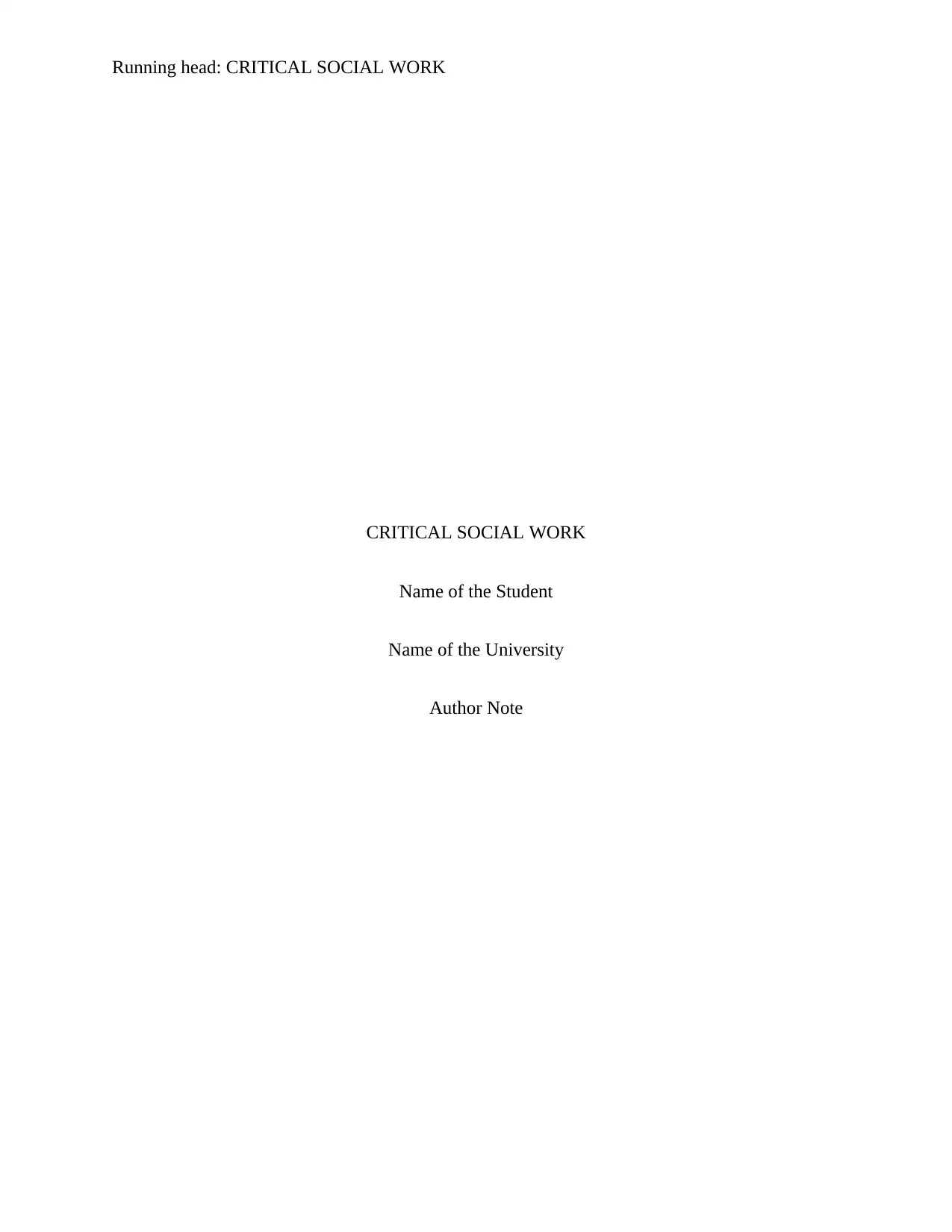
Running head: CRITICAL SOCIAL WORK
CRITICAL SOCIAL WORK
Name of the Student
Name of the University
Author Note
CRITICAL SOCIAL WORK
Name of the Student
Name of the University
Author Note
Paraphrase This Document
Need a fresh take? Get an instant paraphrase of this document with our AI Paraphraser
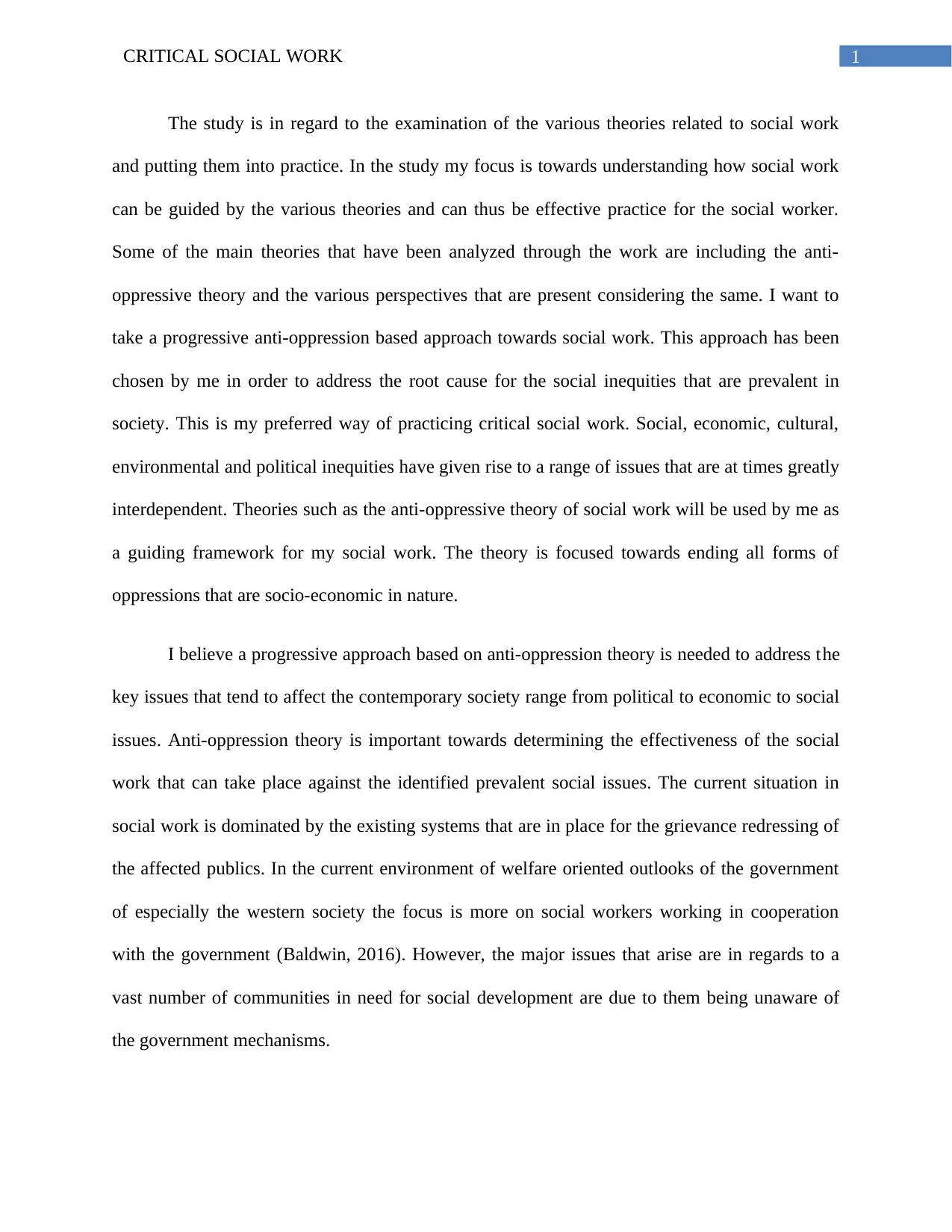
1CRITICAL SOCIAL WORK
The study is in regard to the examination of the various theories related to social work
and putting them into practice. In the study my focus is towards understanding how social work
can be guided by the various theories and can thus be effective practice for the social worker.
Some of the main theories that have been analyzed through the work are including the anti-
oppressive theory and the various perspectives that are present considering the same. I want to
take a progressive anti-oppression based approach towards social work. This approach has been
chosen by me in order to address the root cause for the social inequities that are prevalent in
society. This is my preferred way of practicing critical social work. Social, economic, cultural,
environmental and political inequities have given rise to a range of issues that are at times greatly
interdependent. Theories such as the anti-oppressive theory of social work will be used by me as
a guiding framework for my social work. The theory is focused towards ending all forms of
oppressions that are socio-economic in nature.
I believe a progressive approach based on anti-oppression theory is needed to address the
key issues that tend to affect the contemporary society range from political to economic to social
issues. Anti-oppression theory is important towards determining the effectiveness of the social
work that can take place against the identified prevalent social issues. The current situation in
social work is dominated by the existing systems that are in place for the grievance redressing of
the affected publics. In the current environment of welfare oriented outlooks of the government
of especially the western society the focus is more on social workers working in cooperation
with the government (Baldwin, 2016). However, the major issues that arise are in regards to a
vast number of communities in need for social development are due to them being unaware of
the government mechanisms.
The study is in regard to the examination of the various theories related to social work
and putting them into practice. In the study my focus is towards understanding how social work
can be guided by the various theories and can thus be effective practice for the social worker.
Some of the main theories that have been analyzed through the work are including the anti-
oppressive theory and the various perspectives that are present considering the same. I want to
take a progressive anti-oppression based approach towards social work. This approach has been
chosen by me in order to address the root cause for the social inequities that are prevalent in
society. This is my preferred way of practicing critical social work. Social, economic, cultural,
environmental and political inequities have given rise to a range of issues that are at times greatly
interdependent. Theories such as the anti-oppressive theory of social work will be used by me as
a guiding framework for my social work. The theory is focused towards ending all forms of
oppressions that are socio-economic in nature.
I believe a progressive approach based on anti-oppression theory is needed to address the
key issues that tend to affect the contemporary society range from political to economic to social
issues. Anti-oppression theory is important towards determining the effectiveness of the social
work that can take place against the identified prevalent social issues. The current situation in
social work is dominated by the existing systems that are in place for the grievance redressing of
the affected publics. In the current environment of welfare oriented outlooks of the government
of especially the western society the focus is more on social workers working in cooperation
with the government (Baldwin, 2016). However, the major issues that arise are in regards to a
vast number of communities in need for social development are due to them being unaware of
the government mechanisms.
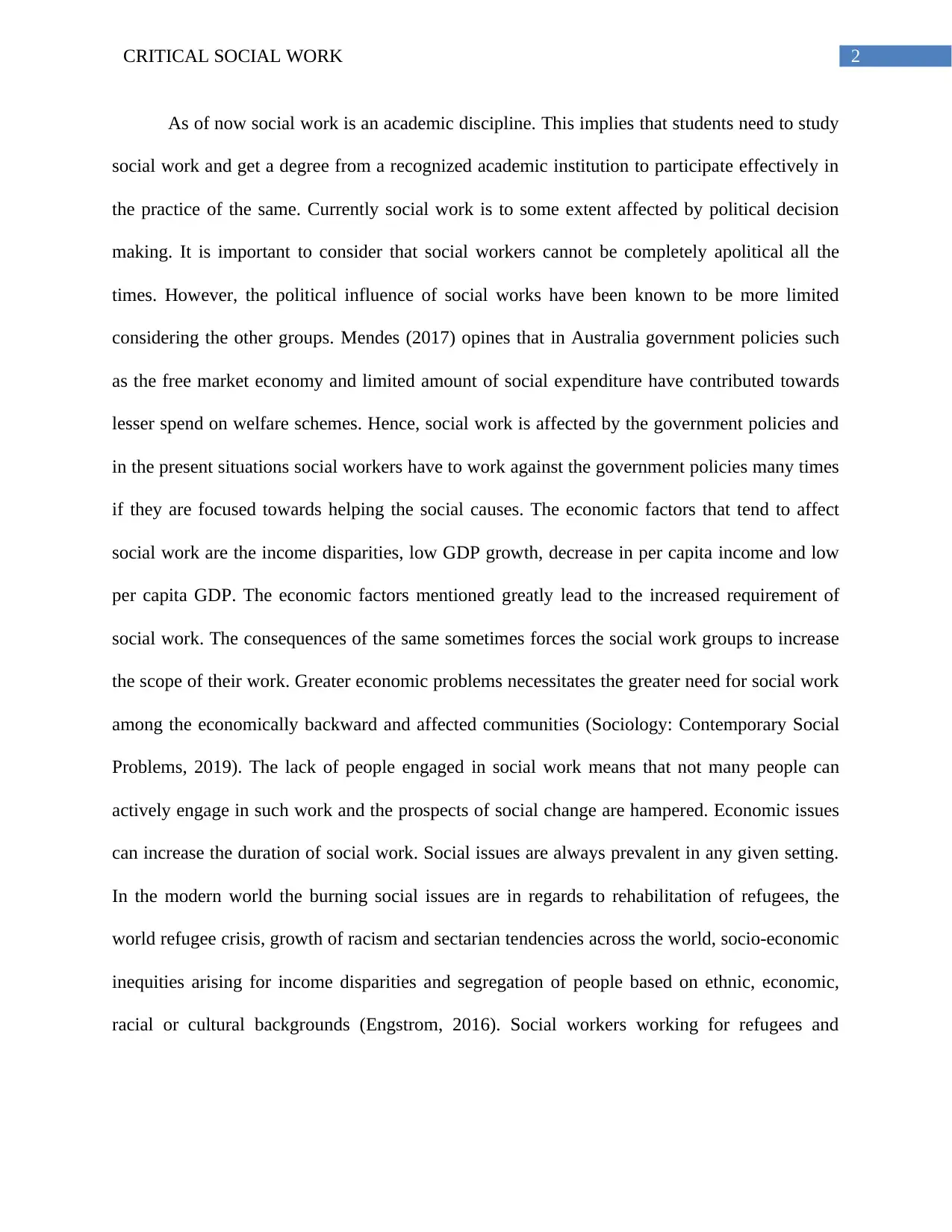
2CRITICAL SOCIAL WORK
As of now social work is an academic discipline. This implies that students need to study
social work and get a degree from a recognized academic institution to participate effectively in
the practice of the same. Currently social work is to some extent affected by political decision
making. It is important to consider that social workers cannot be completely apolitical all the
times. However, the political influence of social works have been known to be more limited
considering the other groups. Mendes (2017) opines that in Australia government policies such
as the free market economy and limited amount of social expenditure have contributed towards
lesser spend on welfare schemes. Hence, social work is affected by the government policies and
in the present situations social workers have to work against the government policies many times
if they are focused towards helping the social causes. The economic factors that tend to affect
social work are the income disparities, low GDP growth, decrease in per capita income and low
per capita GDP. The economic factors mentioned greatly lead to the increased requirement of
social work. The consequences of the same sometimes forces the social work groups to increase
the scope of their work. Greater economic problems necessitates the greater need for social work
among the economically backward and affected communities (Sociology: Contemporary Social
Problems, 2019). The lack of people engaged in social work means that not many people can
actively engage in such work and the prospects of social change are hampered. Economic issues
can increase the duration of social work. Social issues are always prevalent in any given setting.
In the modern world the burning social issues are in regards to rehabilitation of refugees, the
world refugee crisis, growth of racism and sectarian tendencies across the world, socio-economic
inequities arising for income disparities and segregation of people based on ethnic, economic,
racial or cultural backgrounds (Engstrom, 2016). Social workers working for refugees and
As of now social work is an academic discipline. This implies that students need to study
social work and get a degree from a recognized academic institution to participate effectively in
the practice of the same. Currently social work is to some extent affected by political decision
making. It is important to consider that social workers cannot be completely apolitical all the
times. However, the political influence of social works have been known to be more limited
considering the other groups. Mendes (2017) opines that in Australia government policies such
as the free market economy and limited amount of social expenditure have contributed towards
lesser spend on welfare schemes. Hence, social work is affected by the government policies and
in the present situations social workers have to work against the government policies many times
if they are focused towards helping the social causes. The economic factors that tend to affect
social work are the income disparities, low GDP growth, decrease in per capita income and low
per capita GDP. The economic factors mentioned greatly lead to the increased requirement of
social work. The consequences of the same sometimes forces the social work groups to increase
the scope of their work. Greater economic problems necessitates the greater need for social work
among the economically backward and affected communities (Sociology: Contemporary Social
Problems, 2019). The lack of people engaged in social work means that not many people can
actively engage in such work and the prospects of social change are hampered. Economic issues
can increase the duration of social work. Social issues are always prevalent in any given setting.
In the modern world the burning social issues are in regards to rehabilitation of refugees, the
world refugee crisis, growth of racism and sectarian tendencies across the world, socio-economic
inequities arising for income disparities and segregation of people based on ethnic, economic,
racial or cultural backgrounds (Engstrom, 2016). Social workers working for refugees and
⊘ This is a preview!⊘
Do you want full access?
Subscribe today to unlock all pages.

Trusted by 1+ million students worldwide
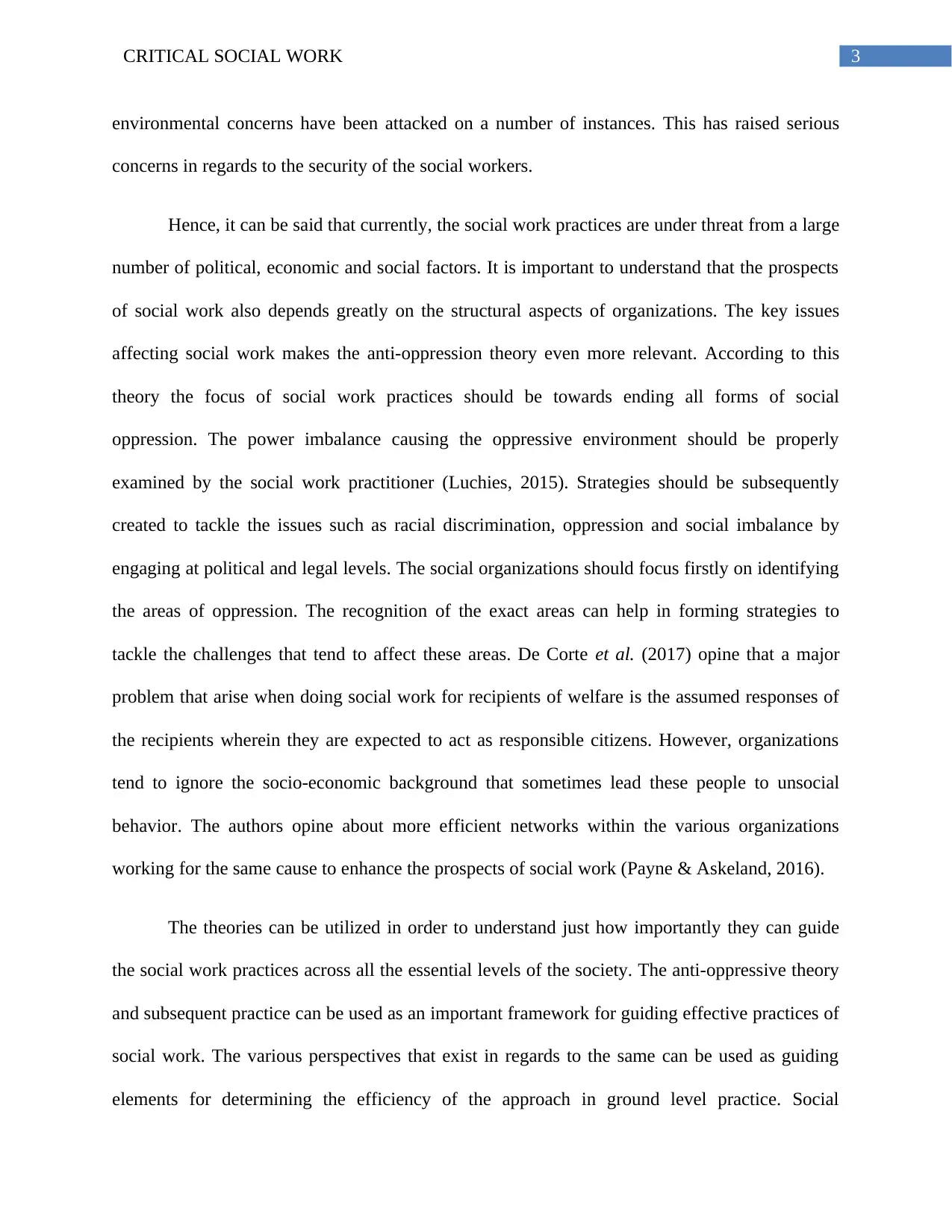
3CRITICAL SOCIAL WORK
environmental concerns have been attacked on a number of instances. This has raised serious
concerns in regards to the security of the social workers.
Hence, it can be said that currently, the social work practices are under threat from a large
number of political, economic and social factors. It is important to understand that the prospects
of social work also depends greatly on the structural aspects of organizations. The key issues
affecting social work makes the anti-oppression theory even more relevant. According to this
theory the focus of social work practices should be towards ending all forms of social
oppression. The power imbalance causing the oppressive environment should be properly
examined by the social work practitioner (Luchies, 2015). Strategies should be subsequently
created to tackle the issues such as racial discrimination, oppression and social imbalance by
engaging at political and legal levels. The social organizations should focus firstly on identifying
the areas of oppression. The recognition of the exact areas can help in forming strategies to
tackle the challenges that tend to affect these areas. De Corte et al. (2017) opine that a major
problem that arise when doing social work for recipients of welfare is the assumed responses of
the recipients wherein they are expected to act as responsible citizens. However, organizations
tend to ignore the socio-economic background that sometimes lead these people to unsocial
behavior. The authors opine about more efficient networks within the various organizations
working for the same cause to enhance the prospects of social work (Payne & Askeland, 2016).
The theories can be utilized in order to understand just how importantly they can guide
the social work practices across all the essential levels of the society. The anti-oppressive theory
and subsequent practice can be used as an important framework for guiding effective practices of
social work. The various perspectives that exist in regards to the same can be used as guiding
elements for determining the efficiency of the approach in ground level practice. Social
environmental concerns have been attacked on a number of instances. This has raised serious
concerns in regards to the security of the social workers.
Hence, it can be said that currently, the social work practices are under threat from a large
number of political, economic and social factors. It is important to understand that the prospects
of social work also depends greatly on the structural aspects of organizations. The key issues
affecting social work makes the anti-oppression theory even more relevant. According to this
theory the focus of social work practices should be towards ending all forms of social
oppression. The power imbalance causing the oppressive environment should be properly
examined by the social work practitioner (Luchies, 2015). Strategies should be subsequently
created to tackle the issues such as racial discrimination, oppression and social imbalance by
engaging at political and legal levels. The social organizations should focus firstly on identifying
the areas of oppression. The recognition of the exact areas can help in forming strategies to
tackle the challenges that tend to affect these areas. De Corte et al. (2017) opine that a major
problem that arise when doing social work for recipients of welfare is the assumed responses of
the recipients wherein they are expected to act as responsible citizens. However, organizations
tend to ignore the socio-economic background that sometimes lead these people to unsocial
behavior. The authors opine about more efficient networks within the various organizations
working for the same cause to enhance the prospects of social work (Payne & Askeland, 2016).
The theories can be utilized in order to understand just how importantly they can guide
the social work practices across all the essential levels of the society. The anti-oppressive theory
and subsequent practice can be used as an important framework for guiding effective practices of
social work. The various perspectives that exist in regards to the same can be used as guiding
elements for determining the efficiency of the approach in ground level practice. Social
Paraphrase This Document
Need a fresh take? Get an instant paraphrase of this document with our AI Paraphraser
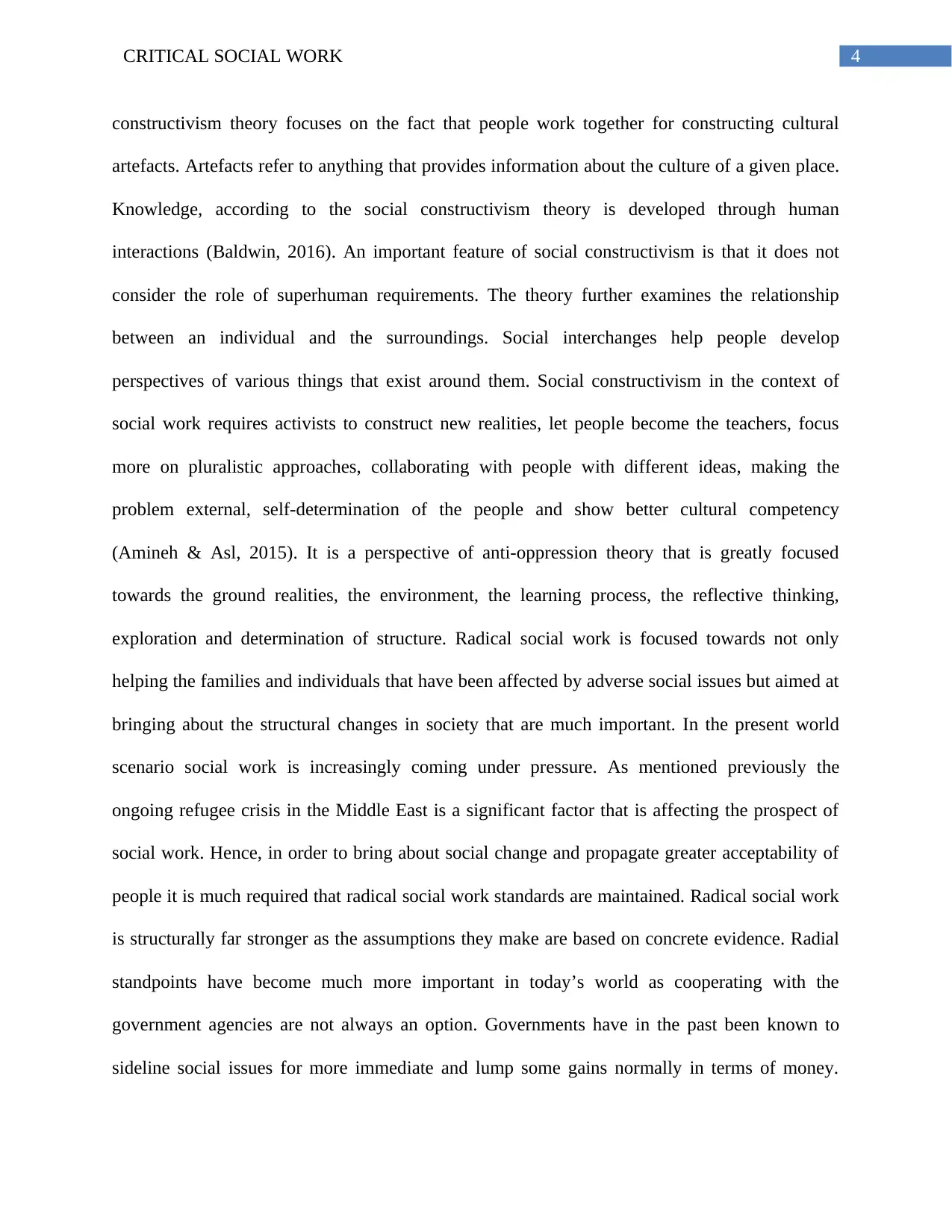
4CRITICAL SOCIAL WORK
constructivism theory focuses on the fact that people work together for constructing cultural
artefacts. Artefacts refer to anything that provides information about the culture of a given place.
Knowledge, according to the social constructivism theory is developed through human
interactions (Baldwin, 2016). An important feature of social constructivism is that it does not
consider the role of superhuman requirements. The theory further examines the relationship
between an individual and the surroundings. Social interchanges help people develop
perspectives of various things that exist around them. Social constructivism in the context of
social work requires activists to construct new realities, let people become the teachers, focus
more on pluralistic approaches, collaborating with people with different ideas, making the
problem external, self-determination of the people and show better cultural competency
(Amineh & Asl, 2015). It is a perspective of anti-oppression theory that is greatly focused
towards the ground realities, the environment, the learning process, the reflective thinking,
exploration and determination of structure. Radical social work is focused towards not only
helping the families and individuals that have been affected by adverse social issues but aimed at
bringing about the structural changes in society that are much important. In the present world
scenario social work is increasingly coming under pressure. As mentioned previously the
ongoing refugee crisis in the Middle East is a significant factor that is affecting the prospect of
social work. Hence, in order to bring about social change and propagate greater acceptability of
people it is much required that radical social work standards are maintained. Radical social work
is structurally far stronger as the assumptions they make are based on concrete evidence. Radial
standpoints have become much more important in today’s world as cooperating with the
government agencies are not always an option. Governments have in the past been known to
sideline social issues for more immediate and lump some gains normally in terms of money.
constructivism theory focuses on the fact that people work together for constructing cultural
artefacts. Artefacts refer to anything that provides information about the culture of a given place.
Knowledge, according to the social constructivism theory is developed through human
interactions (Baldwin, 2016). An important feature of social constructivism is that it does not
consider the role of superhuman requirements. The theory further examines the relationship
between an individual and the surroundings. Social interchanges help people develop
perspectives of various things that exist around them. Social constructivism in the context of
social work requires activists to construct new realities, let people become the teachers, focus
more on pluralistic approaches, collaborating with people with different ideas, making the
problem external, self-determination of the people and show better cultural competency
(Amineh & Asl, 2015). It is a perspective of anti-oppression theory that is greatly focused
towards the ground realities, the environment, the learning process, the reflective thinking,
exploration and determination of structure. Radical social work is focused towards not only
helping the families and individuals that have been affected by adverse social issues but aimed at
bringing about the structural changes in society that are much important. In the present world
scenario social work is increasingly coming under pressure. As mentioned previously the
ongoing refugee crisis in the Middle East is a significant factor that is affecting the prospect of
social work. Hence, in order to bring about social change and propagate greater acceptability of
people it is much required that radical social work standards are maintained. Radical social work
is structurally far stronger as the assumptions they make are based on concrete evidence. Radial
standpoints have become much more important in today’s world as cooperating with the
government agencies are not always an option. Governments have in the past been known to
sideline social issues for more immediate and lump some gains normally in terms of money.
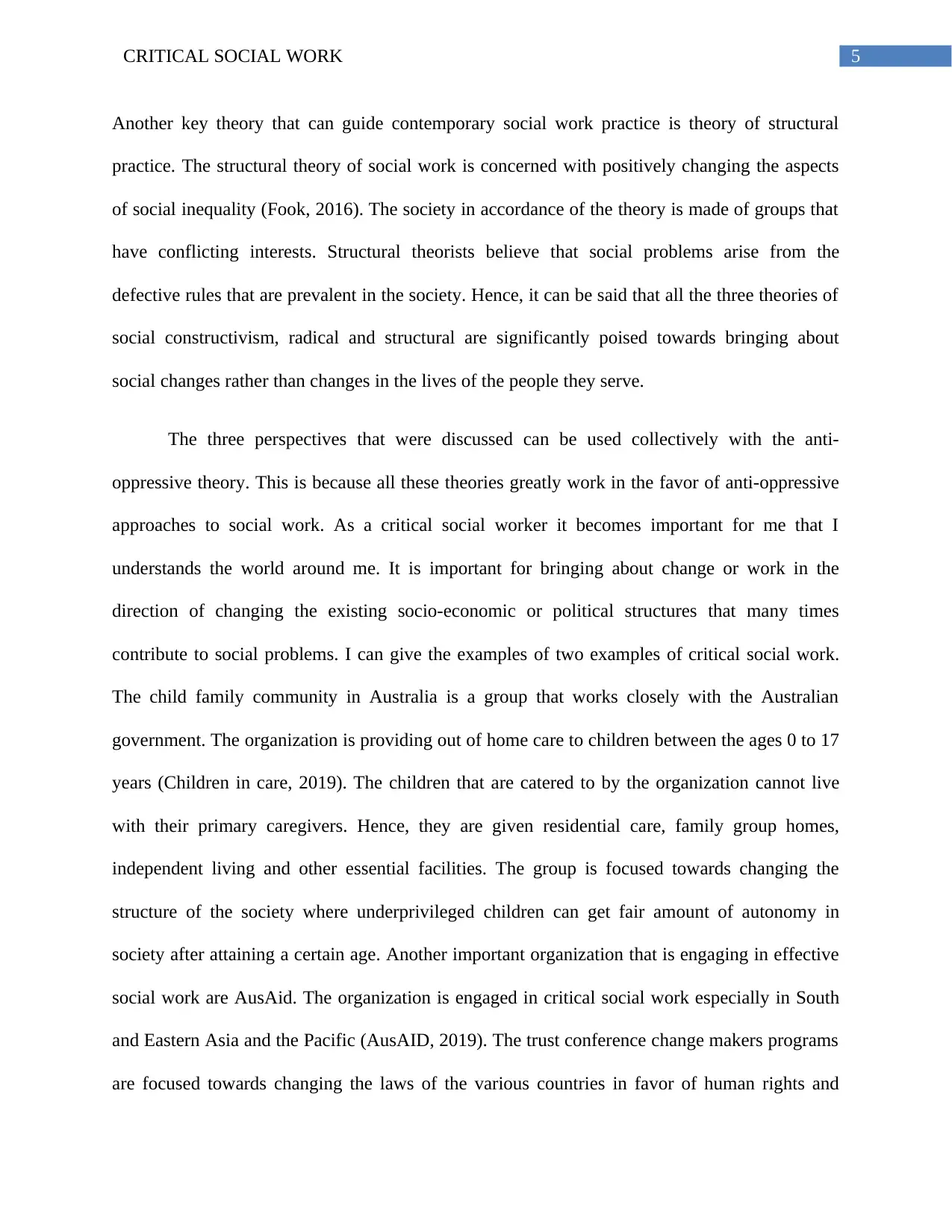
5CRITICAL SOCIAL WORK
Another key theory that can guide contemporary social work practice is theory of structural
practice. The structural theory of social work is concerned with positively changing the aspects
of social inequality (Fook, 2016). The society in accordance of the theory is made of groups that
have conflicting interests. Structural theorists believe that social problems arise from the
defective rules that are prevalent in the society. Hence, it can be said that all the three theories of
social constructivism, radical and structural are significantly poised towards bringing about
social changes rather than changes in the lives of the people they serve.
The three perspectives that were discussed can be used collectively with the anti-
oppressive theory. This is because all these theories greatly work in the favor of anti-oppressive
approaches to social work. As a critical social worker it becomes important for me that I
understands the world around me. It is important for bringing about change or work in the
direction of changing the existing socio-economic or political structures that many times
contribute to social problems. I can give the examples of two examples of critical social work.
The child family community in Australia is a group that works closely with the Australian
government. The organization is providing out of home care to children between the ages 0 to 17
years (Children in care, 2019). The children that are catered to by the organization cannot live
with their primary caregivers. Hence, they are given residential care, family group homes,
independent living and other essential facilities. The group is focused towards changing the
structure of the society where underprivileged children can get fair amount of autonomy in
society after attaining a certain age. Another important organization that is engaging in effective
social work are AusAid. The organization is engaged in critical social work especially in South
and Eastern Asia and the Pacific (AusAID, 2019). The trust conference change makers programs
are focused towards changing the laws of the various countries in favor of human rights and
Another key theory that can guide contemporary social work practice is theory of structural
practice. The structural theory of social work is concerned with positively changing the aspects
of social inequality (Fook, 2016). The society in accordance of the theory is made of groups that
have conflicting interests. Structural theorists believe that social problems arise from the
defective rules that are prevalent in the society. Hence, it can be said that all the three theories of
social constructivism, radical and structural are significantly poised towards bringing about
social changes rather than changes in the lives of the people they serve.
The three perspectives that were discussed can be used collectively with the anti-
oppressive theory. This is because all these theories greatly work in the favor of anti-oppressive
approaches to social work. As a critical social worker it becomes important for me that I
understands the world around me. It is important for bringing about change or work in the
direction of changing the existing socio-economic or political structures that many times
contribute to social problems. I can give the examples of two examples of critical social work.
The child family community in Australia is a group that works closely with the Australian
government. The organization is providing out of home care to children between the ages 0 to 17
years (Children in care, 2019). The children that are catered to by the organization cannot live
with their primary caregivers. Hence, they are given residential care, family group homes,
independent living and other essential facilities. The group is focused towards changing the
structure of the society where underprivileged children can get fair amount of autonomy in
society after attaining a certain age. Another important organization that is engaging in effective
social work are AusAid. The organization is engaged in critical social work especially in South
and Eastern Asia and the Pacific (AusAID, 2019). The trust conference change makers programs
are focused towards changing the laws of the various countries in favor of human rights and
⊘ This is a preview!⊘
Do you want full access?
Subscribe today to unlock all pages.

Trusted by 1+ million students worldwide
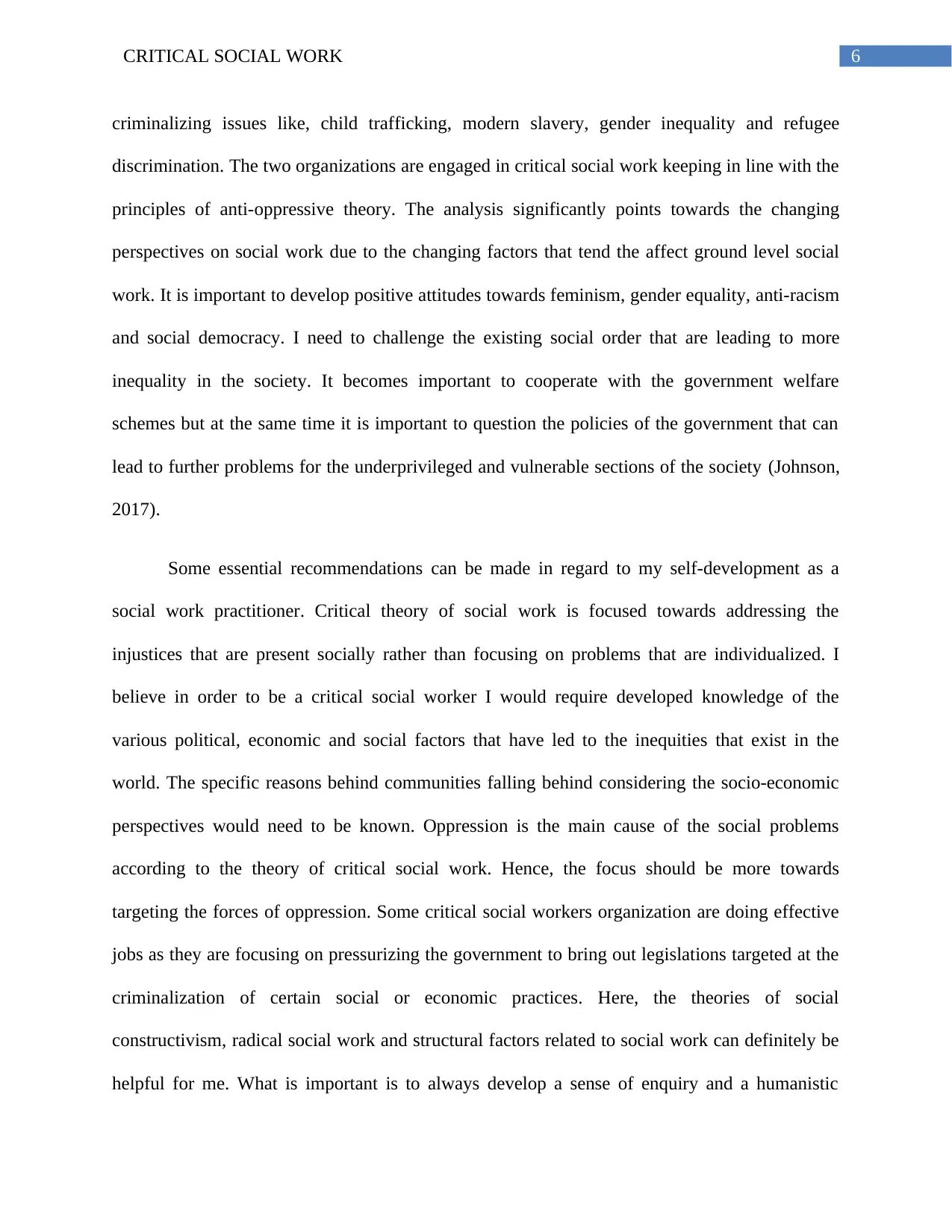
6CRITICAL SOCIAL WORK
criminalizing issues like, child trafficking, modern slavery, gender inequality and refugee
discrimination. The two organizations are engaged in critical social work keeping in line with the
principles of anti-oppressive theory. The analysis significantly points towards the changing
perspectives on social work due to the changing factors that tend the affect ground level social
work. It is important to develop positive attitudes towards feminism, gender equality, anti-racism
and social democracy. I need to challenge the existing social order that are leading to more
inequality in the society. It becomes important to cooperate with the government welfare
schemes but at the same time it is important to question the policies of the government that can
lead to further problems for the underprivileged and vulnerable sections of the society (Johnson,
2017).
Some essential recommendations can be made in regard to my self-development as a
social work practitioner. Critical theory of social work is focused towards addressing the
injustices that are present socially rather than focusing on problems that are individualized. I
believe in order to be a critical social worker I would require developed knowledge of the
various political, economic and social factors that have led to the inequities that exist in the
world. The specific reasons behind communities falling behind considering the socio-economic
perspectives would need to be known. Oppression is the main cause of the social problems
according to the theory of critical social work. Hence, the focus should be more towards
targeting the forces of oppression. Some critical social workers organization are doing effective
jobs as they are focusing on pressurizing the government to bring out legislations targeted at the
criminalization of certain social or economic practices. Here, the theories of social
constructivism, radical social work and structural factors related to social work can definitely be
helpful for me. What is important is to always develop a sense of enquiry and a humanistic
criminalizing issues like, child trafficking, modern slavery, gender inequality and refugee
discrimination. The two organizations are engaged in critical social work keeping in line with the
principles of anti-oppressive theory. The analysis significantly points towards the changing
perspectives on social work due to the changing factors that tend the affect ground level social
work. It is important to develop positive attitudes towards feminism, gender equality, anti-racism
and social democracy. I need to challenge the existing social order that are leading to more
inequality in the society. It becomes important to cooperate with the government welfare
schemes but at the same time it is important to question the policies of the government that can
lead to further problems for the underprivileged and vulnerable sections of the society (Johnson,
2017).
Some essential recommendations can be made in regard to my self-development as a
social work practitioner. Critical theory of social work is focused towards addressing the
injustices that are present socially rather than focusing on problems that are individualized. I
believe in order to be a critical social worker I would require developed knowledge of the
various political, economic and social factors that have led to the inequities that exist in the
world. The specific reasons behind communities falling behind considering the socio-economic
perspectives would need to be known. Oppression is the main cause of the social problems
according to the theory of critical social work. Hence, the focus should be more towards
targeting the forces of oppression. Some critical social workers organization are doing effective
jobs as they are focusing on pressurizing the government to bring out legislations targeted at the
criminalization of certain social or economic practices. Here, the theories of social
constructivism, radical social work and structural factors related to social work can definitely be
helpful for me. What is important is to always develop a sense of enquiry and a humanistic
Paraphrase This Document
Need a fresh take? Get an instant paraphrase of this document with our AI Paraphraser
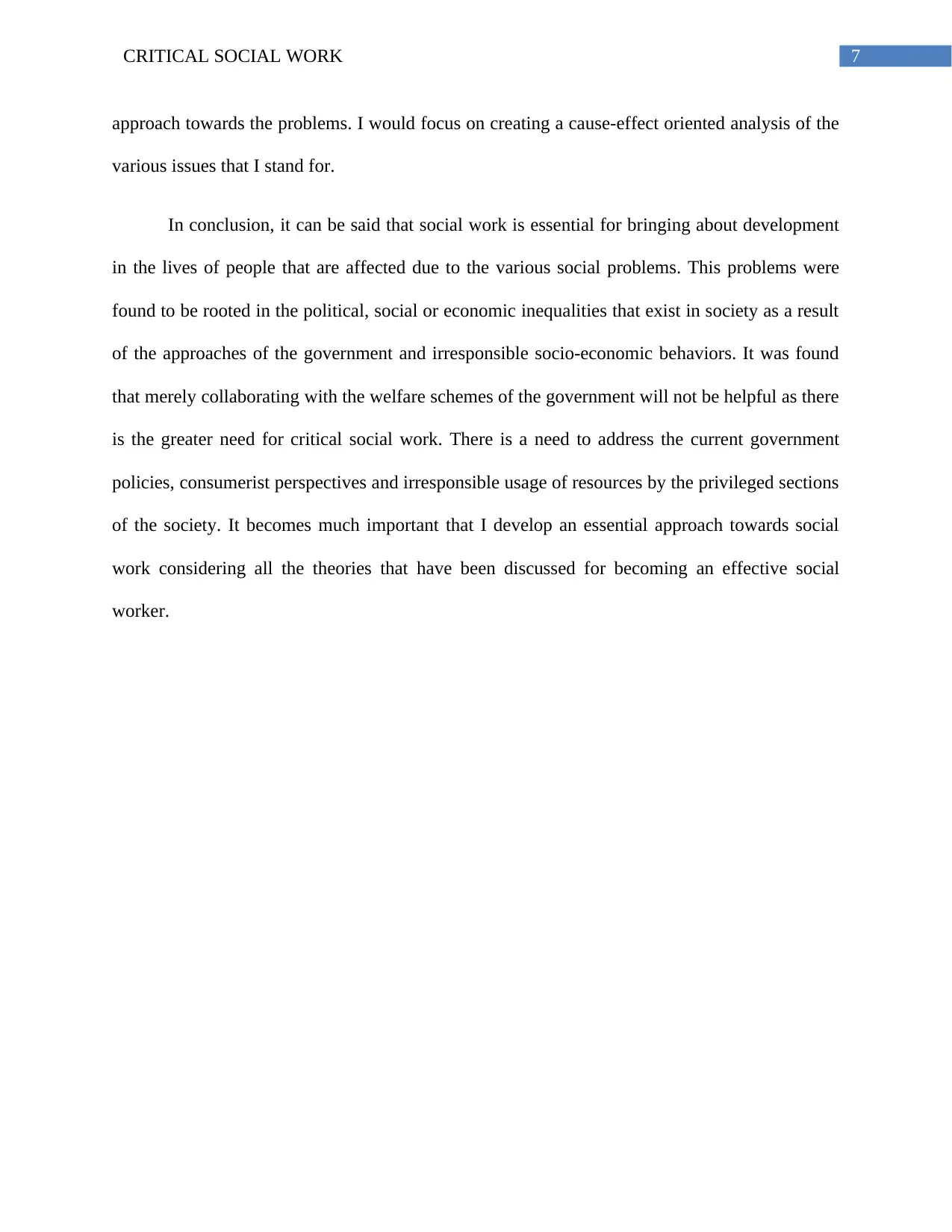
7CRITICAL SOCIAL WORK
approach towards the problems. I would focus on creating a cause-effect oriented analysis of the
various issues that I stand for.
In conclusion, it can be said that social work is essential for bringing about development
in the lives of people that are affected due to the various social problems. This problems were
found to be rooted in the political, social or economic inequalities that exist in society as a result
of the approaches of the government and irresponsible socio-economic behaviors. It was found
that merely collaborating with the welfare schemes of the government will not be helpful as there
is the greater need for critical social work. There is a need to address the current government
policies, consumerist perspectives and irresponsible usage of resources by the privileged sections
of the society. It becomes much important that I develop an essential approach towards social
work considering all the theories that have been discussed for becoming an effective social
worker.
approach towards the problems. I would focus on creating a cause-effect oriented analysis of the
various issues that I stand for.
In conclusion, it can be said that social work is essential for bringing about development
in the lives of people that are affected due to the various social problems. This problems were
found to be rooted in the political, social or economic inequalities that exist in society as a result
of the approaches of the government and irresponsible socio-economic behaviors. It was found
that merely collaborating with the welfare schemes of the government will not be helpful as there
is the greater need for critical social work. There is a need to address the current government
policies, consumerist perspectives and irresponsible usage of resources by the privileged sections
of the society. It becomes much important that I develop an essential approach towards social
work considering all the theories that have been discussed for becoming an effective social
worker.
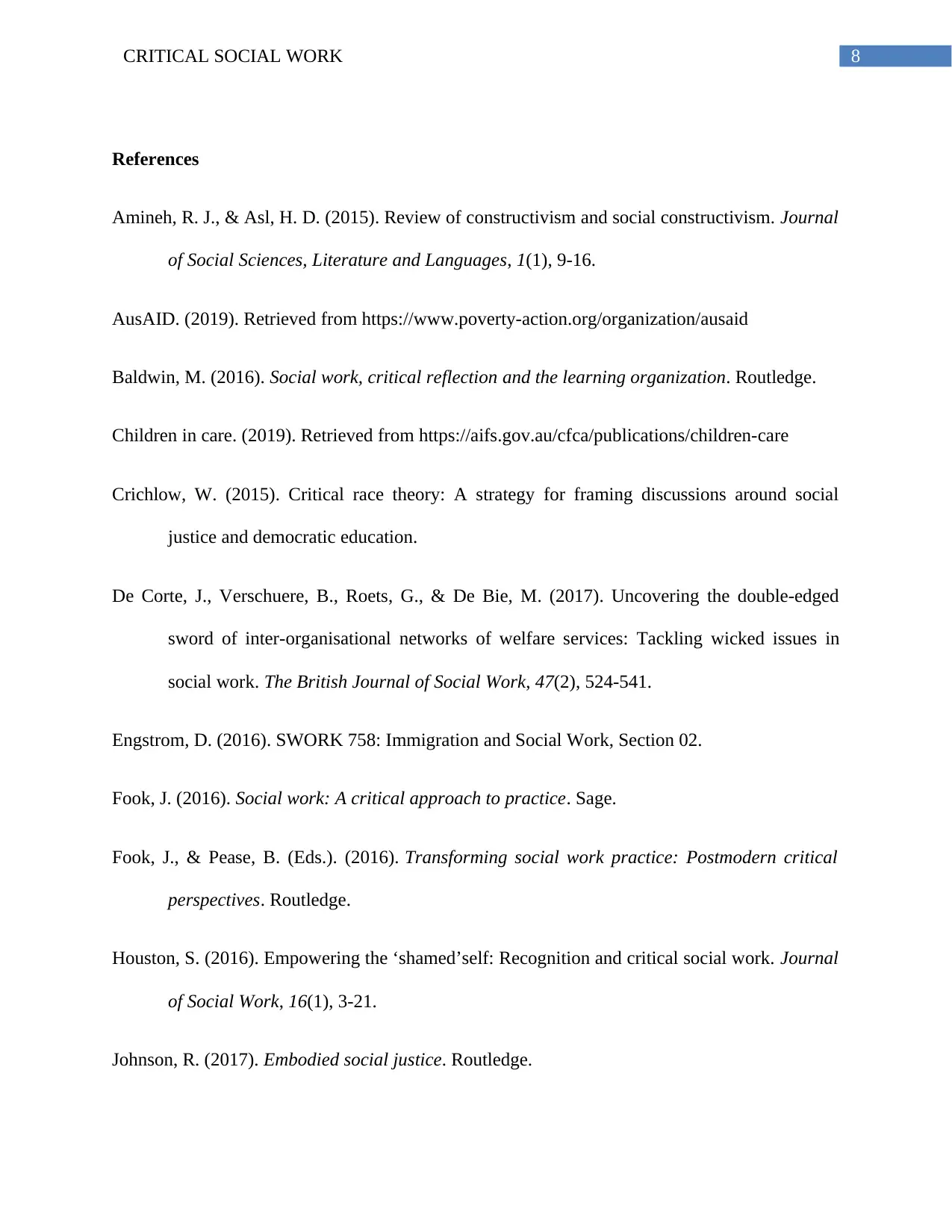
8CRITICAL SOCIAL WORK
References
Amineh, R. J., & Asl, H. D. (2015). Review of constructivism and social constructivism. Journal
of Social Sciences, Literature and Languages, 1(1), 9-16.
AusAID. (2019). Retrieved from https://www.poverty-action.org/organization/ausaid
Baldwin, M. (2016). Social work, critical reflection and the learning organization. Routledge.
Children in care. (2019). Retrieved from https://aifs.gov.au/cfca/publications/children-care
Crichlow, W. (2015). Critical race theory: A strategy for framing discussions around social
justice and democratic education.
De Corte, J., Verschuere, B., Roets, G., & De Bie, M. (2017). Uncovering the double-edged
sword of inter-organisational networks of welfare services: Tackling wicked issues in
social work. The British Journal of Social Work, 47(2), 524-541.
Engstrom, D. (2016). SWORK 758: Immigration and Social Work, Section 02.
Fook, J. (2016). Social work: A critical approach to practice. Sage.
Fook, J., & Pease, B. (Eds.). (2016). Transforming social work practice: Postmodern critical
perspectives. Routledge.
Houston, S. (2016). Empowering the ‘shamed’self: Recognition and critical social work. Journal
of Social Work, 16(1), 3-21.
Johnson, R. (2017). Embodied social justice. Routledge.
References
Amineh, R. J., & Asl, H. D. (2015). Review of constructivism and social constructivism. Journal
of Social Sciences, Literature and Languages, 1(1), 9-16.
AusAID. (2019). Retrieved from https://www.poverty-action.org/organization/ausaid
Baldwin, M. (2016). Social work, critical reflection and the learning organization. Routledge.
Children in care. (2019). Retrieved from https://aifs.gov.au/cfca/publications/children-care
Crichlow, W. (2015). Critical race theory: A strategy for framing discussions around social
justice and democratic education.
De Corte, J., Verschuere, B., Roets, G., & De Bie, M. (2017). Uncovering the double-edged
sword of inter-organisational networks of welfare services: Tackling wicked issues in
social work. The British Journal of Social Work, 47(2), 524-541.
Engstrom, D. (2016). SWORK 758: Immigration and Social Work, Section 02.
Fook, J. (2016). Social work: A critical approach to practice. Sage.
Fook, J., & Pease, B. (Eds.). (2016). Transforming social work practice: Postmodern critical
perspectives. Routledge.
Houston, S. (2016). Empowering the ‘shamed’self: Recognition and critical social work. Journal
of Social Work, 16(1), 3-21.
Johnson, R. (2017). Embodied social justice. Routledge.
⊘ This is a preview!⊘
Do you want full access?
Subscribe today to unlock all pages.

Trusted by 1+ million students worldwide
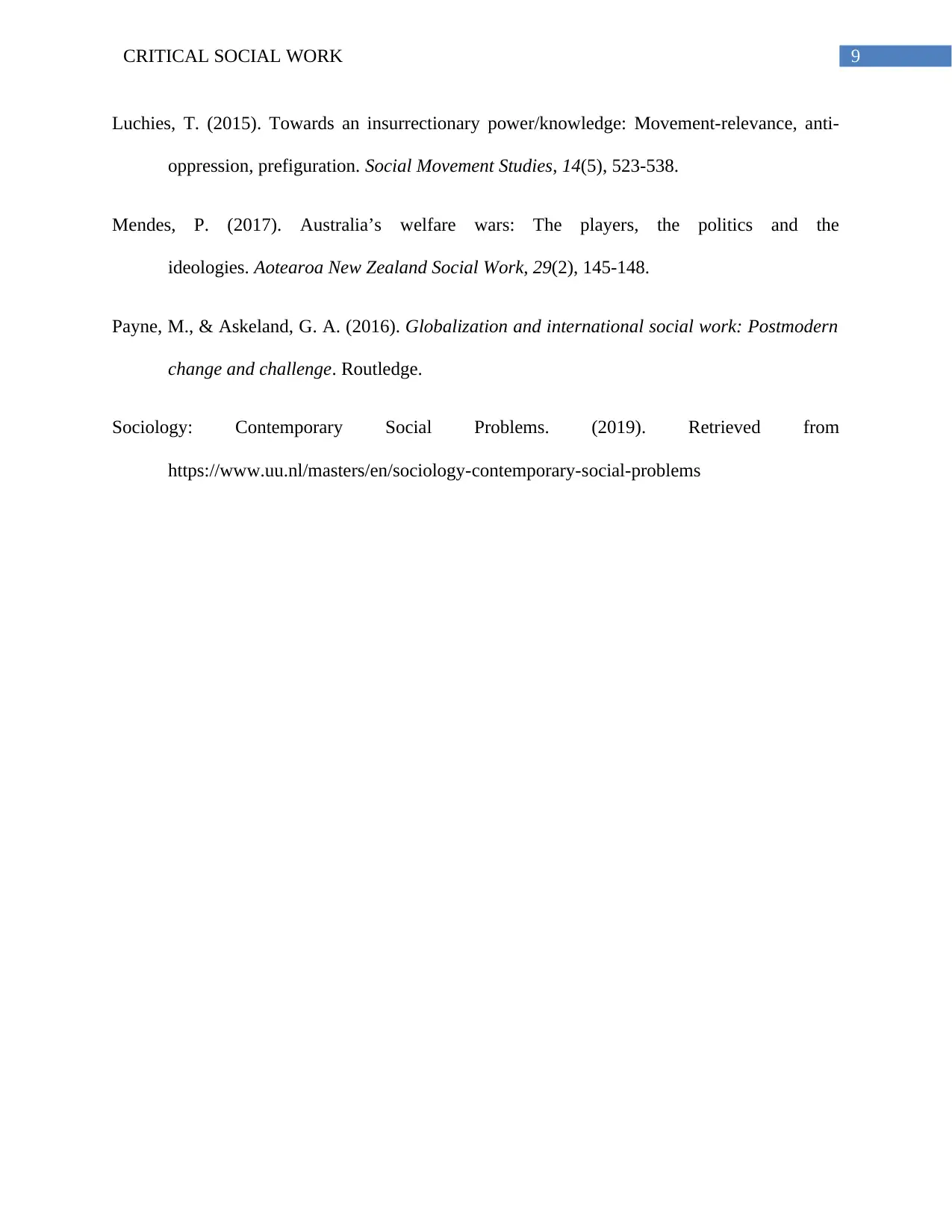
9CRITICAL SOCIAL WORK
Luchies, T. (2015). Towards an insurrectionary power/knowledge: Movement-relevance, anti-
oppression, prefiguration. Social Movement Studies, 14(5), 523-538.
Mendes, P. (2017). Australia’s welfare wars: The players, the politics and the
ideologies. Aotearoa New Zealand Social Work, 29(2), 145-148.
Payne, M., & Askeland, G. A. (2016). Globalization and international social work: Postmodern
change and challenge. Routledge.
Sociology: Contemporary Social Problems. (2019). Retrieved from
https://www.uu.nl/masters/en/sociology-contemporary-social-problems
Luchies, T. (2015). Towards an insurrectionary power/knowledge: Movement-relevance, anti-
oppression, prefiguration. Social Movement Studies, 14(5), 523-538.
Mendes, P. (2017). Australia’s welfare wars: The players, the politics and the
ideologies. Aotearoa New Zealand Social Work, 29(2), 145-148.
Payne, M., & Askeland, G. A. (2016). Globalization and international social work: Postmodern
change and challenge. Routledge.
Sociology: Contemporary Social Problems. (2019). Retrieved from
https://www.uu.nl/masters/en/sociology-contemporary-social-problems
1 out of 10
Related Documents
Your All-in-One AI-Powered Toolkit for Academic Success.
+13062052269
info@desklib.com
Available 24*7 on WhatsApp / Email
![[object Object]](/_next/static/media/star-bottom.7253800d.svg)
Unlock your academic potential
Copyright © 2020–2026 A2Z Services. All Rights Reserved. Developed and managed by ZUCOL.





